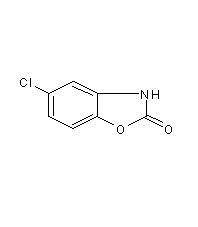chlorzoxazone

structural formula
| physical competition number | 028v |
|---|---|
| molecular formula | c7h4clno2 |
| molecular weight | 169.57 |
| label |
5-chloro-2-benzoxazolone, chlorzoxazone, 5-chloro-2-benzoxazolone, 5-chloro-2-benzoxazolone, 5-chloro-2-hydroxybenzoxazole |
numbering system
cas number:95-25-0
mdl number:mfcd00005717
einecs number:202-403-9
rtecs number:dm5250000
brn number:none
pubchem number:24277702
physical property data
1. properties: crystal.
2. density (g/ml, 20℃): undetermined
3. relative vapor density (g/ml, air=1): undetermined
4. melting point (ºc): 191~191.5
5. boiling point (ºc, normal pressure): undetermined
6. boiling point (ºc, kpa): undetermined
7. refractive index: undetermined
8. flash point (ºc): undetermined
9. specific rotation (º): undetermined
p>
10. autoignition point or ignition temperature (ºc): undetermined
11. vapor pressure (mmhg, ºc): undetermined
12. saturated vapor pressure (kpa, ºc): undetermined
13. heat of combustion (kj/mol): undetermined
14. critical temperature (ºc): undetermined
15. critical pressure (kpa): undetermined
16. log value of oil-water (octanol/water) distribution coefficient: undetermined
17. explosion upper limit (%, v /v): undetermined
18. lower explosion limit (%, v/v): undetermined
19. solubility: easily soluble in ammonia, soluble in methanol, ethanol, isopropyl alcohol, slightly soluble in water.
toxicological data
1. acute toxicity: rat oral ld50: 763mg/kg; rat intraperitoneal ld50: 150mg/kg; mouse oral ld50: 900mg/kg; mouse intraperitoneal ld50: 4400mg/kg; mouse intraperitoneal ld50: 50mg/kg; subcutaneous ld50 in mice: 170mg/kg; oral ld50 in hamsters: 662mg/kg; intraperitoneal ld50 in hamsters: 166mg/kg; mammalian intraperitoneal ld50: 550mg/kg;
ecological data
slightly harmful to water.
molecular structure data
1. molar refractive index: 39.18
2. molar volume (cm3/mol): 114.0
3. isotonic specific volume (90.2k ): 303.2
4. surface tension (dyne/cm): 50.0
5. polarizability (10-24cm3): 15.53
compute chemical data
1. reference value for hydrophobic parameter calculation (xlogp): none
2. number of hydrogen bond donors: 1
3. number of hydrogen bond acceptors: 2
4. number of rotatable chemical bonds: 0
5. number of tautomers: 2
6. topological molecule polar surface area 38.3
7 .number of heavy atoms: 11
8. surface charge: 0
9. complexity: 185
10. number of isotope atoms: 0
11. determine the number of atomic stereocenters: 0
12. uncertain number of atomic stereocenters: 0
13. determine the number of chemical bond stereocenters: 0
14. number of uncertain chemical bond stereocenters: 0
15. number of covalent bond units: 1
properties and stability
avoid contact with oxides.
storage method
store sealed in a cool, dry place. make sure the workspace has good ventilation. keep sealed. keep away from sources of fire and store away from oxidizing agents.
synthesis method
it is prepared from 2-amino-5-chlorobenzoxazole.
purpose
none
extended-reading:https://www.morpholine.org/teda-l33b-dabco-polycat-gel-catalyst/extended-reading:https://www.newtopchem.com/archives/44087extended-reading:https://www.cyclohexylamine.net/dabco-2039-catalyst-2039/extended-reading:https://www.bdmaee.net/niax-a-4e-tertiary-amine-catalyst-/extended-reading:https://www.newtopchem.com/archives/38913extended-reading:https://www.newtopchem.com/archives/1120extended-reading:https://www.newtopchem.com/archives/category/products/page/132extended-reading:https://www.bdmaee.net/wp-content/uploads/2021/05/138-2.jpgextended-reading:https://www.bdmaee.net/dabco-nem-catalyst-cas100-74-3–germany/extended-reading:https://www.bdmaee.net/dioctyl-dimaleate-di-n-octyl-tin-cas33568-99-9-dioctyl-dimaleate-di-n-octyl-tin/

